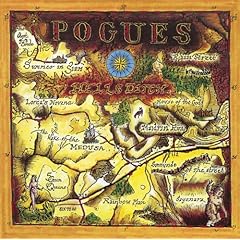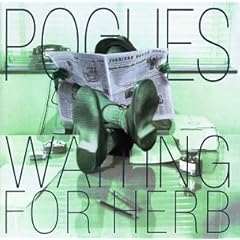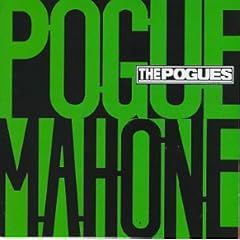 In The Pogues’ breakthrough 1988 single “Fairytale of New York” (download), songwriter Shane MacGowan and guest vocalist Kirsty MacColl portray a codependent couple. He’s an aging alcoholic, gone beyond repentance, no longer even able to summon up an insincere promise to change. Her devotion to him has destroyed her patience, ruined her health; his devotion to the bottle has left him full of resentment and self-pity.
In The Pogues’ breakthrough 1988 single “Fairytale of New York” (download), songwriter Shane MacGowan and guest vocalist Kirsty MacColl portray a codependent couple. He’s an aging alcoholic, gone beyond repentance, no longer even able to summon up an insincere promise to change. Her devotion to him has destroyed her patience, ruined her health; his devotion to the bottle has left him full of resentment and self-pity.
But they’ll get back together, as they always do, and the dance of love and hate will go on. They’ll remember the good times, before it all went south, and cling to each other in mutual self-delusion. MacGowan’s genius is in showing us how willing these people are to let themselves be deluded. It’s a brilliant, harrowing bit of songwriting. And, whether MacGowan intended it so or not, it’s a brutally honest summation of the group dynamic of the Pogues.
Origins
What you think you know about The Pogues is mostly right. Irish by ethnicity if not by birth, the name from the Gaelic pogue mahone (“kiss my ass”). Folky tunes played at punk velocity, by turns sentimental and profane. Lots of heavy drinking. Lead singer possessed of the most heinous set of gnashers in all Christendom. All correct — but missing a little context.
In Julien Temple’s Sex Pistols doc The Filth and the Fury, you can see Shane MacGowan hamming it up in the archival footage; and, like seemingly everybody else who saw the Pistols in their heyday, he went out and started his own band straightaway. After a stab at fame with his punkabilly outfit the Nipple Erectors, MacGowan hit upon an idea as simple as it was audacious — to apply punk’s DIY, anyone-can-do-it aesthetic to Anglo-Irish folksong, a musical form that valued scholarship and tradition.
MacGowan quickly recruited his sometimes housemates Jem Finer (banjo and guitar) and Peter “Spider” Stacy (vocals, tin whistle) into his new, folk-informed project. James Fearnley, briefly guitarist for the Nipple Erectors, was drafted to play accordion — an instrument he’d never touched — on the grounds that he’d taken piano lessons when he was young. Bassist Cait O’Riordan, only 17 at the time, had met MacGowan when the latter was working at a record shop. Drummer Andrew Ranken, who’d been fronting an R&B big band, was last to join the line-up. The new band, Pogue Mahone, played their first gig in late 1982, and spent the next year or two playing shows, pissing off folk purists and punks alike, and slowly building a following.

Red Roses for Me (1984)
purchase this album (Amazon)
The band’s first recording, Red Roses for Me, is evenly split between MacGowan originals and reworked traditional songs. The sound is raw — though Finer and Ranken were journeyman musicians, O’Riordan and Stacy were enthusiastic amateurs at best — but producer Stan Brennan recorded them like a folk group, muting much of the energy that was still their greatest asset in a live setting. MacGowan’s songwriting chops were already apparent in the indelible chorus to “Streams of Whiskey” (download), but the barking vocals are oddly subdued, and there’s no snap in the rhythms. Hints of the band’s future power emerge in the spaghetti-western slither of “Boys from the County Hell” (download), and in a freeform wail through Brendan Behan‘s “The Auld Triangle” (download), but overall Red Roses sounds like a blueprint for better records to come.
As the band gigged around the UK, they continued to attract high-profile fans, including Joe Strummer, filmmaker Alex Cox, and Elvis Costello.

Rum, Sodomy, and the Lash (1985)
purchase this album (Amazon)
With the Costello-produced second album, the Pogues began to deliver on their promise. The sound is still primarily acoustic, but it’s fuller — former Radiators from Space guitarist Philip Chevron, who guested on Red Roses, comes on board as a permanent member — and Costello brings a rock ‘n’ roll excitement to the proceedings from the opening cut, the gleefully profane “Sickbed of Cu Culhainn” (download). MacGowan produced his first real classics in “A Pair of Brown Eyes” (download) — a woozy, impressionistic account of a barroom conversation, the horrors of war, and the pains of love — and the black-comic tall tale “Sally MacLennane” (download). Although he was already the focal point, Rum, Sodomy, and the Lash still sounds like the work of a band, and finds room for vocal turns from Stacy, Ranken, and O’Riordan: her lovely take on the traditional “I’m a Man You Don’t Meet Every Day” (download) is a quiet respite in this raucous carnival of a record. The disc closes with a towering version of Eric Bogle‘s anti-war classic “And the Band Played Waltzing Matilda” (download)
Soundtracks and Poguetry in Motion (1986)
Work on the follow-up to Rum, Sodomy, and the Lash was delayed by a series of personnel shakeups and a foray into film. Director Alex Cox asked the Pogues to contribute to the soundtrack to Sid and Nancy; along with several instrumentals (mostly composed by Finer and Ranken), the group donated “Haunted,” a MacGowan original featuring O’Riordan’s finest vocal. The girl-group sound of “Haunted” (download) gives a hint of MacGowan’s fascination with 60s pop — a strain of the Pogues’ musical DNA that is often overlooked.
A stopgap EP, Poguetry in Motion (out of print), finds the group’s musical reach expanding, in part due to the arrival of journeyman folkie Terry Woods — recruited by Pogues manager Frank Murray, who’d known him when Woods was briefly a member of Steeleye Span –— on mandolin and cittern. Jem Finer begins to come into his own as a composer; the maudlin ballad “Rainy Night In Soho” coasts on a gorgeous orchestral arrangement, while “London Girl” (download) spotlights Fearnley’s accordion in a British Invasion pop framework. The EP’s highlight is probably “The Body of an American” (download), wedding one of MacGowan’s most sharply-observed lyrics to a sing-along refrain.
The entire band then decamped to Spain, where they had been cast in Alex Cox’s deranged Sergio Leone homage Straight to Hell, along with Costello, Joe Strummer, and a very young Courtney Love, among many others. The film itself — essentially an extended, boozy in-joke — is not without its charms, but the soundtrack features a clutch of hidden gems, including “Rake at the Gates of Hell” (download) and the original recording of “If I Should Fall from Grace With God” (download) — which would become the title track of the third full-length Pogues disc.

If I Should Fall from Grace With God (1988)
purchase this album (Amazon)
After filming Straight to Hell, Costello and O’Riordan were married, and O’Riordan left the Pogues. Longtime roadie Darryl Hunt came aboard as bass player, solidifying the lineup that would last for five years and three albums. Where O’Riordan had never been much more than a thumper, Hunt brought a solid groove and even a touch of swing, vastly expanding the band’s musical range. The songs on Fall from Grace turn on a dime from two-steps to ballads to big-band jive, with a dash of Spanish fiesta music for good measure.
While MacGowan is still the dominant songwriter, Fall from Grace sees significant contributions from the other Pogues, from Finer and Ranken’s jazzy “Metropolis” to Terry Woods’s arrangement of the sea chantey “South Australia” (download). Philip Chevron brings out the album’s secret weapon, the emigrant anthem “Thousands are Sailing” (download) — one of the most emotionally affecting songs the Pogues ever recorded.
Steve Lillywhite‘s production is thick, but not muddy. If it loses some nuance (compare the album version of the title cut to the original, for instance), it emphasizes the band’s sheer power, bringing clarity and punch even to MacGowan’s wordiest songs, like the racetrack yarn “Bottle of Smoke” (download). Lillywhite is also responsible for bringing in MacColl — then Mrs. Lillywhite — as MacGowan’s duet partner for “Fairytale of New York,” the least-likely Christmas classic since those damned barking dogs.
The Pogues continued to build their reputation in the States on the strength of their ferocious live gigs; the addition of Hunt and Woods added both energy and precision to the band’s stage show, and MacGowan — for all the tales of his prodigious boozing — was a snarling, cursing, surly anti-star. Electrifying in spite of himself, he effortlessly became the center of attention. And that’s where it all began to go wrong.
The cult of personality surrounding Shane MacGowan is the worst thing to ever happen to the Pogues. In addition to facilitating MacGowan’s slow-motion self-destruction — the Holy Genius cannot be held to same standards as lesser mortals, or so goes the myth — it devalues the work of the rest of the band, all of whom are terrific players and songwriters in their own right. They found themselves cast as enablers for a talented alcoholic; and, as anyone who’s ever watched a codependent relationship in action (or, God forbid, been in one themselves) knows that these things always last longer than you think they will — but they can’t last forever.

Peace and Love (1989)
purchase this album (Amazon)
An artistic watershed, but also the beginning of the end, this set was almost impossibly eclectic. With the band’s secondary songwriters coming to the fore, the sound was one left turn after another, from the spy jazz of “Gridlock” to the Caribbean highlife of Chevron’s “Blue Heaven,” Finer’s lush balladry, and Terry Woods’s pub-ready romps. MacGowan’s half of the record had a dark, druggy tinge exemplified by the foggy Bo Diddley-isms of “U.S.A.” The single “White City” (download) was a high spot — a summation of the band’s strengths — but more typical is the droning, mildly psychedelic “Down All the Days” (download). Kirsty MacColl returned to duet with perpetual underdog Phil Chevron on “Lorelei” (download), a straight-up rock hymn.
The experimental nature of Peace and Love made it a deep, rewarding listen — but between the grooves, evidence of MacGowan’s disintegration was piling up. A drop-off in his diction was evident, and the inclusion of good-natured studio goofs like “Cotton Fields” smelled like filler. Bad enough — but live shows were positively worrying. MacGowan went on tangents, forgot lyrics, laughed to himself, and sometimes simply wandered offstage as the band vamped gamely, shooting nervous glances at each other. There had always been nights when the band had carried him, but now it was becoming routine.

Hell’s Ditch (1990)
purchase this album (Amazon)
Recorded with longtime friend of the band Joe Strummer behind the board, Hell’s Ditch sounds at first blush like a partial return to form. MacGowan comes back with nine new songs, and the band’s folk-pop attack is crisper than ever; but it never sounds like an essential record. It’s their Pussy Cats, in a way — a boozy lark, good-humored but insubstantial.
Take “Five Green Queens and Jean” (download). It’s one of MacGowan’s prettiest melodies, with an arrangement that captures an atmosphere of lazy afternoons — all in the service of wispy little nothing of a lyric. Now, I’m not so pompous as to believe that a record has to have to have an element of social importance to be great; but when a band has so many pissy masterpieces on its résumé, it’s dismaying to see them retreat to this sort of genial half-assedness.
Listening to “Sunnyside of the Street” (download), with great lines like “As my mother wept, it was then I swore / to take my life as I would a whore” bumping alongside cringers like “Been in a palace and I’ve been in a jail / I just don’t want to be reborn a snail,” it’s easy to imagine MacGowan dashing the lyrics on the back of an envelope — and still having room for the stamp. (In fairness, Terry Woods’s two songs are even lazier.) The best songs, and the most deeply felt, are the darkest — MacGowan’s grim fable “Lorca’s Novena” (download) and the Mediterranean-tinged title track.
By now the trouble signs were unmissable, and on the eve of a U.S. tour in support of Hell’s Ditch MacGowan dropped out (or, more likely, was booted), citing “ill health.” His last-minute replacement was none other than Joe Strummer, and the resultant shows were extraordinary. Strummer’s gruff, open-hearted charisma was a perfect match for the band. With a late-set cover of “London Calling” the only nod to his rock-star past, Strummer seemed born to front the Pogues.

Waiting for Herb (1993)
purchase this album (Amazon)
The prospect of a full-time Strummer-led Pogues remained just an intriguing might-have-been. When the band reconvened for their sixth album, Spider Stacy had assumed frontman duties. It’s an odd decision. MacGowan left big shoes to fill, but Stacy seemed particularly ill-suited to fill them; of the remaining Pogues, he’s neither as distinctive nor as versatile a singer as Woods, or even Chevron. Odd, too, is the choice of Michael Brook as producer. A compatriot of Brian Eno, he softens the band’s trademark thwack and sweetens the sound with discreet synths and the whine of his own “infinite guitar.”
It works brilliantly on the opening track and single “Tuesday Morning” (download), Stacy’s sole songwriting credit and as perfect a pop song as anyone could wish for — but the record drops off immediately. All the members contribute songs — except, inexplicably, Chevron — with Finer emerging as de facto chief songwriter. Finer had always been good for a tune or two on previous records, but he’s stretched pretty thin here. The first-timer’s efforts range from the banal (Hunt’s “Big City”) to the truly awful (Fearnley’s interminable, tuneless “Drunken Boat”). Old pro Terry Woods seems spent, too. Only Ranken shines, coming on like a meth-tweaked Tom Waits on the mutant blues “My Baby’s Gone” (download).
Overall, though, there was an air that The Pogues had reached a point of diminishing returns — an impression bolstered when Woods, Chevron, and Fearnley all jumped ship shortly after recording Waiting for Herb, leaving the remaining Pogues to tour with a stage full of ringers. The shows were dispiriting. There was little attempt to retool the old songs to suit the reconfigured band; the group played it by the numbers, with Stacy offering up a second-rate MacGowan impersonation in lieu of a more personal approach. The Pogues seemed content to trade on their established brand name.

Pogue Mahone (1996)
purchase this album (Amazon)
Stacy, Finer, Ranken, and Hunt took the touring band into the studio for a record that — from its no-imagination title on down — seemed like a last gasp. Steve Brown’s production is lush and energetic, and Stacy’s gentle voice is credible on the big ballads like “Love You Till the End” (download). But songs like “Oretown” (download) are essentially generic, “Celtic”-tinged AAA — everything the Pogues were reacting against, twenty years before. After a final tour, Finer called it quits, and the band dissolved.
Aftermath
In the five-year hiatus that followed, Kirsty MacColl died. Joe Strummer died. Philip Chevron got throat cancer, but pulled through. Shane MacGowan, somehow, managed not to die. The record companies resequenced, repackaged, and rereleased the records, over and over, and everybody got paid. Only MacGowan pursued anything resembling a functional solo career, and only sporadically. The others paddled around aimlessly — starting new bands, re-forming old ones, playing the occasional gig. Finer took a post as artist-in-residence at Oxford; Stacy, at one point, took over as frontman for a Pogues tribute band. Nothing that amounted to much.
It’s puzzling, on the surface of it. These are all immensely talented people, seasoned performers with lots of contacts. Any one of them should have been able to put together a session career, a touring spot with a major artist, something. But for half a decade, they spun their wheels, waiting for the inevitable reunion. And they got it. MacGowan rejoined the Pogues for a set of shows at Christmas, 2001, and they’ve performed together on and off, in various configurations, ever since.
Here’s the thing: The Pogues are a band less undone by Demon Rum than by codependency. The same failure of will that kept any of the band members from forging a significant career outside the Pogues is what keeps them returning MacGowan’s phone calls. Finer and Stacy had ambition, up to a point — but they just couldn’t break away to start a life without him.
And now, the Fall from Grace-era lineup is reunited in its entirety, and the shows are selling out. And if nobody seems interested in writing or recording any new material, well, what of it? There’s a new five-disc boxed set coming out, packed with rare and unreleased material; what more could a true fan ask? And if MacGowan is looking puffy these days, if his voice is a whisper of what it was, well, the fans still come in for the shows, don’t they?
Because that’s the thing about enablers — they always take the drunkard back.





Comments